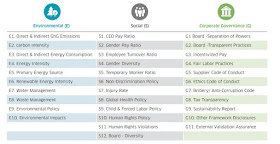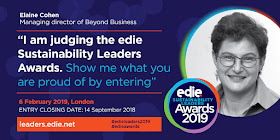 There are plenty of excellent reasons to attend the Asia Sustainability Reporting Summit on 2nd and 3rd October 2018. I won't list them all here.
There are plenty of excellent reasons to attend the Asia Sustainability Reporting Summit on 2nd and 3rd October 2018. I won't list them all here. Just take a look at the website and you'll be convinced. Instead, I'll tell you a story.
Once upon a time, there was a little girl called Suyin. Suyin lived with her mother and father and seven younger siblings in a remote part of Asia, in a wooden hut, far from the hustle and bustle of the big cities and the stresses of daily living in modern times. Suyin and her family were a close-knit group, relying on each other for love, support and inspiration. They lived on the resources of the earth, fishing, hunting and farming, taking from the land only what they needed to survive without wasting any precious resources. It was a simple existence, but it was a good one.
As Suyin advanced in age, she noticed with each passing year that life in their region was becoming tougher. Rainfall patterns were changing, water levels were dropping in nearby streams, the soil was not as fertile as it once was, local wildlife had ceased to thrive. Slowly, Suyin was perceiving that her land was refusing to provide for them. And when she was just 19, there was a major typhoon that shook their wooden hut to its foundations, barely leaving it standing.
Suyin was worried about the long-term survival of her family. She knew she had to do something. Amid tears of farewell, she left her family, promising to return. She travelled by foot without a cent to her name until she reached a major city and there, she begged for food and money. What she was given, she saved. And when she had saved enough money, she rented a small room, and took a job in a small store. She did well. She was intelligent, capable and thoughtful and soon enough, she had enough money to fund a place at university, as she knew that without education, she would not advance and be able to help her beloved family.
After studying, she was fortunate to be offered a job in a large corporation, in the Sustainability Department. In that role, she campaigned to mitigate climate change and advance social programs that would help families living in remote areas. She became a true sustainability leader, speaking all around Asia on the need to save the land and prevent environmental degradation, as well as taking care of communities and their ability to survive and thrive. Many companies followed her lead and joined the sustainability movement to drive positive change for prosperity. During this time, Suyin returned frequently to visit her family, provide them with resources and help them overcome their challenges. For example, she purchased a small farmer irrigation kit from Netafim so that they could irrigate the couple of acres they farmed and gain greater yields of fruit and vegetables with less water.
In 2018, a colleague nominated Suyin in the annual listing of exceptional female sustainability leaders in the region, Asia's Top Sustainability Superwomen, an initiative of CSR Works International. Suyin was overwhelmed. She had never received such recognition for doing only what she thought was right. But will Suyin's nomination be accepted? Will Suyin shine through? How many more Sustainability Superwomen have been nominated and who will gain recognition at the Asia Sustainability Reporting Summit?
You can discover if Suyin is included in this prestigious list of Sustainability Superwomen in October in Singapore, at the Asia Sustainability Reporting Summit. Even if you don't get to meet Suyin, you will be able to engage with a host of inspiring women sustainability leaders and experts who have driven the sustainability agenda in Asia with passion and overcome challenges to ensure their voice is heard and improve life for all of us.
Come to the summit and celebrate Sustainability Superwomen with all of us. Overall, there'll be more than 60 international speakers (not ALL of them are women, however!) who will cover every important aspect of sustainability reporting in depth. You will hear directly from top leaders from
• Agility
• AIG
• Bangchak Corporation
• Baoviet Holdings
• Bombay Stock Exchange
• CapitaLand
• CDP
• City Developments Limited (CDL)
• CLP Power
• CP Group
• DBS Bank
• EcoVadis
• Golden Agri-Resources
• GRI
• Hang Lung Properties
• Intel
• International Integrated Reporting Council (IIRC)
• John Swire & Sons
• JSW Group
• Kalbe Farma
• Maritime Ports Authority Singapore
• Microsoft
• MSCI
• RobecoSAM (DJSI)
• Schneider Electric
• Sime Darby
• Singtel
• SM Investments
• Suntory Food & Beverage
• Sustainability Accountability Standards Board (SASB)
• Tata Consultancy Services
• Union Bank of the Philippines
• Viego Eiris
• WWF
and the list goes on
And of course, I will be there, co-chairing the summit with the man behind it all, Rajesh Chhabara.
Exciting debates and insights that will help you move the needle include:
Looking forward to a fun couple of days of learning, sharing, challenging and celebrating. Hope to see you there!
elaine cohen, CSR Consultant, Sustainability Reporter, former HR Professional, Trust Across America 2017 Lifetime Achievement Award honoree, Ice Cream Addict, Author of three totally groundbreaking books on sustainability (see About Me page). Contact me via Twitter (@elainecohen) or via my business website www.b-yond.biz (Beyond Business Ltd, an inspired CSR consulting and Sustainability Reporting firm). Need help writing your first / next Sustainability Report? Contact elaine: info@b-yond.biz
Elaine will be co-chairing the second annual Asia Sustainability Reporting Summit 2018 in Singapore on 2/3 OCtober. Join me there!
You can discover if Suyin is included in this prestigious list of Sustainability Superwomen in October in Singapore, at the Asia Sustainability Reporting Summit. Even if you don't get to meet Suyin, you will be able to engage with a host of inspiring women sustainability leaders and experts who have driven the sustainability agenda in Asia with passion and overcome challenges to ensure their voice is heard and improve life for all of us.
Come to the summit and celebrate Sustainability Superwomen with all of us. Overall, there'll be more than 60 international speakers (not ALL of them are women, however!) who will cover every important aspect of sustainability reporting in depth. You will hear directly from top leaders from
• Agility
• AIG
• Bangchak Corporation
• Baoviet Holdings
• Bombay Stock Exchange
• CapitaLand
• CDP
• City Developments Limited (CDL)
• CLP Power
• CP Group
• DBS Bank
• EcoVadis
• Golden Agri-Resources
• GRI
• Hang Lung Properties
• Intel
• International Integrated Reporting Council (IIRC)
• John Swire & Sons
• JSW Group
• Kalbe Farma
• Maritime Ports Authority Singapore
• Microsoft
• MSCI
• RobecoSAM (DJSI)
• Schneider Electric
• Sime Darby
• Singtel
• SM Investments
• Suntory Food & Beverage
• Sustainability Accountability Standards Board (SASB)
• Tata Consultancy Services
• Union Bank of the Philippines
• Viego Eiris
• WWF
and the list goes on
And of course, I will be there, co-chairing the summit with the man behind it all, Rajesh Chhabara.
Exciting debates and insights that will help you move the needle include:
Looking forward to a fun couple of days of learning, sharing, challenging and celebrating. Hope to see you there!
elaine cohen, CSR Consultant, Sustainability Reporter, former HR Professional, Trust Across America 2017 Lifetime Achievement Award honoree, Ice Cream Addict, Author of three totally groundbreaking books on sustainability (see About Me page). Contact me via Twitter (@elainecohen) or via my business website www.b-yond.biz (Beyond Business Ltd, an inspired CSR consulting and Sustainability Reporting firm). Need help writing your first / next Sustainability Report? Contact elaine: info@b-yond.biz























